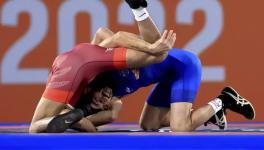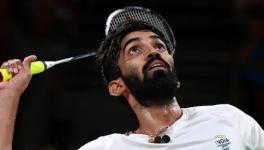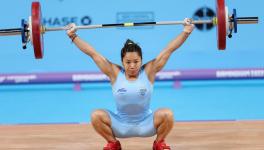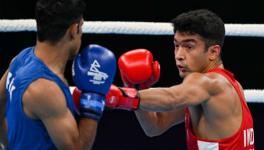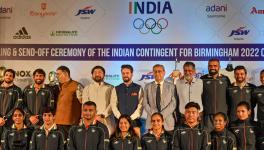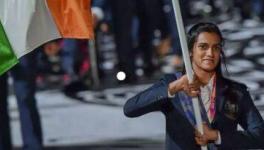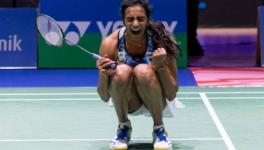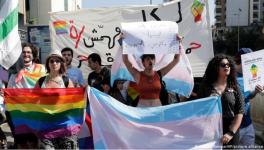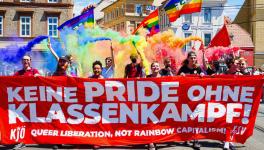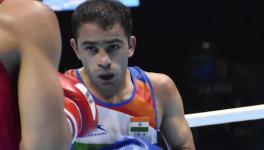Let the Change Begin! Big Sport Needs to Embrace Diversity By Acting, Not Just Advertising
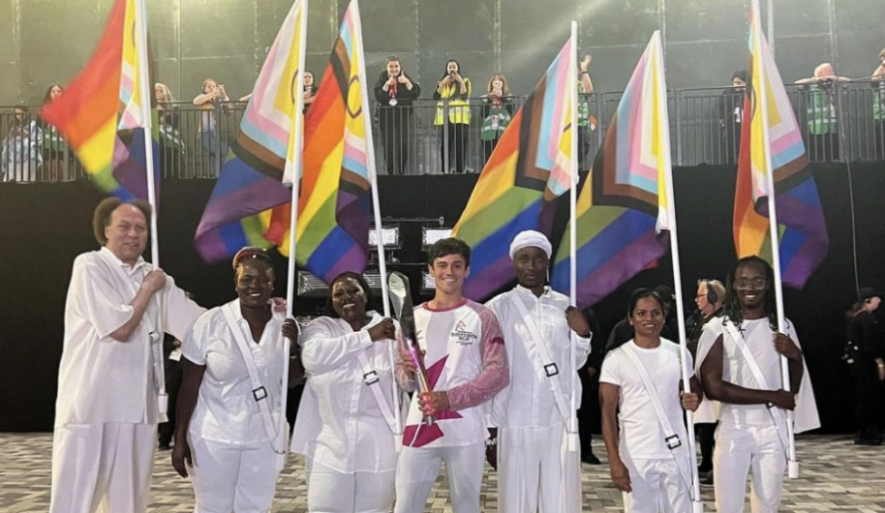
At the 2022 Commonwealth Games opening ceremony, Dutee Chand (2nd right) was the only competing athlete in the mix who held aloft the Pride flag. LGBTQ+ activists Bismi Alimi of Nigeria, Glenroy Murray from Jamaica, Moud Goba from Zimbabwe, Jason Jones from Trinidad and Tobago and Prossy Kakooza from Uganda were the other participants alongside Tom Daley, who carried the Queen’s Baton (Picture: Daley, Instagram).
We tend to trust sport, and by extension athletes, to come good when it matters. It is a precedent set on the playing field — all those victories against odds. Beating the odds is celebrated widely because it provides a larger-than-the-game narrative that serves many purposes — from feel-good stories to geopolitical powerplay and hard economics. At times, it facilitates meaningful social conversations, if not full blown social change.
However, the odds tend to be ruthless for those who put a lot at stake when attempting to reveal realities for the world to mull, reflect and possibly make amends over. So what is really at stake for an athlete who stands up for a larger cause, looking beyond their primary quest for a medal at the Olympics or the Commonwealth Games? They, invariably, pay for it with their careers. At times with life, and with sanity.
While San Jose University may have immortalised Tommie Smith and John Carlos’ black power salute at the 1968 Olympics, in reality that gesture cost them their careers. In its immediate aftermath, they were thrown out of the Games village, criticised, ostracised and hounded into oblivion in the US. The celebration and accolades have come a few decades too late (better than never). But they paid a price for it in the prime of their careers.
Also Read | 2022 Commonwealth Games, Day 2: Gold for Mirabai Chanu, Injured Sanket Sargar Wins Silver
Watching athletes take the knee during the Black Lives Matter movement half a century on was a reminder that some things remain the same. Colin Kaepernik, one of the first sportspersons to take the knee to protest police brutality in the US, is still without an NFL team, and has been since he first took the knee. Meanwhile, athletes who followed the cultural movement’s trajectory in the wake of Black Lives Matter protests, saw it gain acceptance (to the point of becoming propaganda) from big sport and have faced no such repercussions.
What Tom Daley or Dutee Chand did during the opening ceremony of the 2022 Commonwealth Games at Birmingham’s Alexander Stadium — despite the blessing of the organisers and a much more woke world — also comes with its own odds. That needs to be spoken about much like the message they are striving to convey for it adds context, completing the bleak picture. A picture that badly needs colour correction (pun intended).
Olympic diving champion Daley, while carrying the Queen’s Baton, was flanked by Indian sprint champion Chand and five others LGBTQ+ rights crusaders, who held aloft Pride flags to send out a strong message against homophobia that is prevalent in the Commonwealth countries. More than half — 35 out of the 56 Commonwealth member states — criminalise same-sex relationships. They, in fact, constitute almost half the countries across the world to have outlawed homosexuality. Seven Commonwealth states have a maximum penalty of life imprisonment under laws imposed during British colonial rule.
The irony of Daley’s symbolic act while carrying the Queen’s Baton, a colonial vestige, to garner voice and action against an archaic, inhuman and discriminative law instituted by the crown itself in the past, is hard to miss. But we should commend the course correction or the attempt. Daley spoke about the sense of safety that an individual is robbed of, simply because of his sexual preference, in these countries.
“I’ve experienced homophobia all my life, competing in countries where it’s illegal to be me and where I don’t feel safe to leave the venue I’m competing in,” Daley was quoted as saying by The Guardian. “If I feel like that as a privileged man, I can’t imagine what day-to-day life is like for LGBTQ+ people around the Commonwealth.”
Also Read | South Africa's WAFCON Victory Inspires Pay Parity Calls
However, the issue here, though Daley puts it squarely on the laws and the need to repeal them, is larger. It has also got to do with the Victorian sense of morality that’s prevalent in most of the countries despite the end of direct British rule. This outdated idea of morality cuts across religious and cultural divides even, making progressive social changes a difficult task.
While changing the law will provide a sense of security for same-sex couples, it is only peripheral. The stigma associated with it remains in said societies, and members of the community will continue to be ostracised. In 2019, when Chand came out as the first Indian homosexual sportsperson, admitting she is in a same-sex relationship, the Olympian spoke about the hounding she had faced her entire life. She faced criticism from all quarters, and the voices made her even question the worth of her existence, she had repeatedly said.
On September 6, 2018, in a landmark judgement, the Supreme Court of India ruled that Section 377 of the Indian Penal Code is unconstitutional and infringed upon the fundamental rights of autonomy, intimacy, and identity. Same-sex relationship was legalised in India even though marriages are not still legally valid. The verdict, and the subsequent change that it has brought about is significant enough. At least in the life of Chand, who said some people started accepting her for who she is after the law was repealed.
Chand has the security of a government job to fall back on, and being an elite athlete, has the backing of the government too. She is “privileged” in her own way — though the privilege enjoyed by Daley as a British citizen, and a man, is quite a far cry from that of an Indian woman coming from a remote village in Orissa.
The privilege we are talking about is the social capital to lead a normal life in her place of choice. And, more importantly, being in a society, which accords the individual, be it Chand or a daily-wage labourer in Mumbai or Delhi or a farmhand in Uttar Pradesh or Punjab, a dignified existence as a normal human being. That never happens.
Also Read | Euro 2022: Sexism in Women's Football Still Rife
Even big sport, as Daley and Chand can testify, is not the unbiased setting we perceive it to be.
In 2016, just ahead of the Rio Olympics, I had the privilege to interact with Australian swimming legend Ian Thorpe during a promotional event in Mumbai. A year before, Thorpe, one of the most decorated Olympic athletes of all time, had come out. This, after denying that he was an homosexual through his entire sporting career. He had vehemently denied it in his biography too. The duality of his life, the tug of war between his true self and that of his persona as a sports legend, almost tore him apart. He suffered from bouts of depression through his adult life, as he tried to cope with the voices within, one that forced him to question the sense of everything happening around him.
Thorpe is again a privileged athlete when you think of it. He is a legend in his sport. A multiple Olympic gold medallist. Yet, he could not fight and break the bonds that shackled him. And it was not just society. It was the sports world itself. Sports has its own set of gender stereotypes which are arguably more rigid than any societal norms. It is a hostile place, still, for LGBTQ+ persons, despite all the touted and advertised ‘progressive shift’. The pressure is manifold, from the awkwardness they are likely to face from teammates once they come out and expressed their sexual orientation, to the ruthless attacks they could potentially be subjected to, from opposing fans, rivals as well as teammates.
The additional mental battle adds pressure on athletes already under tremendous strain from meeting their personal as well as establishment’s expectations on performance and career goals.
Once they come out, more is dished out. First and foremost, they are expected to lead the crusade, be pioneers. Not many would be comfortable doing that. Not all will have that mental bandwidth to cope with the added pressure of being a vocal activist on LGBTQ+ rights. Some may choose not to speak about it and keep their personal lives to themselves. I realised Thorpe is one of the latter when he showed he was not keen on talking about it. And it is fair. It is his personal choice but then again, the sporting world, through most part of his life, never really allowed him a choice. There is a valid reason why athletes come out towards the end of their playing days, or after it.
Also, there are unwritten, and unspoken pressures from brands who back athletes. While the world seems a progressive space two decades into the 21st century, the universal acceptance of homosexuality, is still lacking. And personality building is key for brand associations as a sportsperson. A personality is created, an embodiment of masculine traits in case of a man, and of feminine strength and sensuality in case of a woman. The pressure of maintaining that persona is immense and even the best succumb, and get torn between the two worlds — real and forced.
Also Read | Cramping Period: To Talk or Not to Talk — the Perpetual Menstrual Gag
Have you wondered why only a very few elite footballers have come out despite the sport being progressive about its stance on many social causes. The hypermasculine world of Formula One, or motorsport in general, where gender stereotypes are very prominent, has zero driver or rider representation from the LGBTQ+ community. The number of professional sportspersons to have come out across various professional individual sports, including tennis, golf, MMA and boxing is miniscule. At the CWG opening ceremony, Chand was the only competing athlete in the mix. Activists Bismi Alimi of Nigeria, Glenroy Murray from Jamaica, Moud Goba from Zimbabwe, Jason Jones from Trinidad and Tobago and Prossy Kakooza from Uganda were the other participants.
The Games facilitate diversity, and it has been spoken about. However, it is not easy for that diversity to be out in the open. And the reason for that is manifold.
So, while the correction in the penal code of nations matters, a larger and pertinent course correction is required in the sporting world too. If Daley, and the fearless voices within are powerless to bring about that change, then the repeal of laws across the globe, and larger societal outlook change, would be impossible to achieve. The odds are stacked here. Then again, beating the odds is always possible in sport. And only in sport. But this time, the ball is not just on the sports star’s court. But on our individual playing fields too. Let the change begin.
Get the latest reports & analysis with people's perspective on Protests, movements & deep analytical videos, discussions of the current affairs in your Telegram app. Subscribe to NewsClick's Telegram channel & get Real-Time updates on stories, as they get published on our website.









